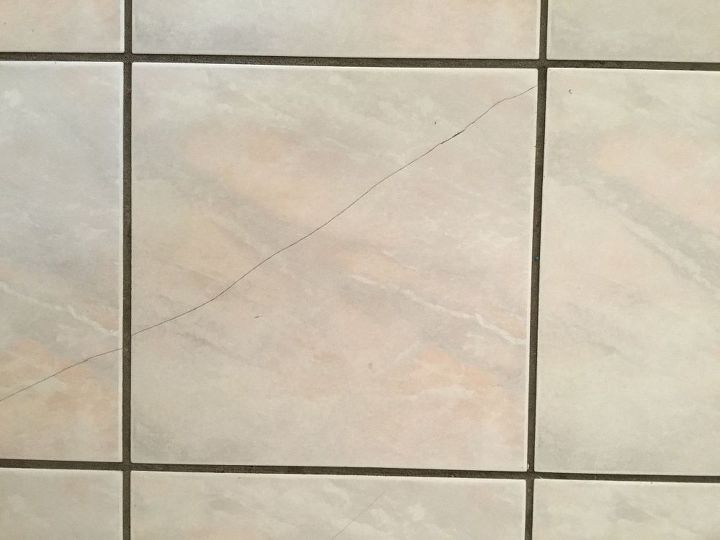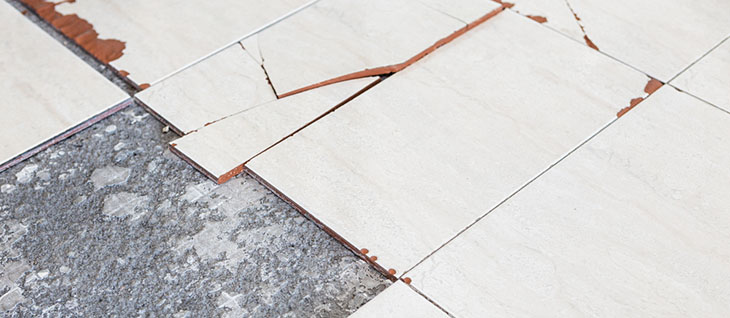Do Cracked Tiles Mean Foundation Problems
Types of foundation cracks, crack patterns, differences in the meaning of cracks in different foundation materials, site conditions, building history, and other evidence of building movement and damage are described to assist in recognizing foundation defects and to help the inspector separate cosmetic or low-risk conditions from those likely.
- Do Cracked Tiles Mean Foundation Problems For A
- Cracked Tiles Mean Foundation Problem
- Do Cracked Tiles Mean Foundation Problems Without
- Do Cracked Tiles Mean Foundation Problems Today
- Do Cracked Tiles Mean Foundation Problems In Hindi
- Do Cracked Tiles Mean Foundation Problems In Pakistan
- Foundation problems also can cause tiles to crack and hardwood flooring to buckle and warp. Warped hardwood floors, especially in a home set on a slab foundation, can be a sign that something is wrong with the concrete foundation. In addition to expansive soil, many homes’ foundations are adversely affected by the following problems.
- Cracks in the home is a common problem, but sometimes it’s not really a problem at all. Many times cracks in the home are simply there and very often they are made evident in tile. Tile is very brittle and cracks under the slightest pressure or movement.
Here at In-House Plumbing, we get a number of calls everyday from homeowners worried they might have slab leaks in their foundation.
With all the incorrect information online, it’s easy to understand why it’s hard to determine what is going on when you find something like a wet spot on your floor—or worse. So we’d like to help you figure out what might be happening.
One misconception we’d like to clear up first, though, is there are no pipes IN the concrete slab. And this means there can’t be a leak within the foundation.
In most cases, the pipes are under the slab. So you if you do have a leak, it is under the foundation. While there are exception to this (a home built with fresh water pipes in the walls), it is highly unlikely any pipes—fresh water or sewer—are in the actual slab.
Depending on the symptom, you could have a sewer leak or leaks, or fresh water leaks. And in some cases, you might not even have a leak at all but a sewer stoppage problem.
Below are some of the most common signs and symptoms of the different types of plumbing problems you might be experiencing.
Signs of Sewer Problems
An important thing to note is the only time there is water in your sewer lines is when you run water or flush the toilet. Your sewer system is designed to run on gravity meaning the pipes are installed at a slight decline.
Anytime you run water in your house or flush the toilet, the water drains with gravity’s help down through the system, out to the main sewer line, and eventually to the city lines.
Sewer Clog or Blockage
Backups or Overflows – If water backs up or overflows when you flush the toilet or turn on and run water, it’s most likely you have a clog somewhere in in your sewer system. Because a sewer system is designed to run on gravity, if there is something blocking or clogging a sewer pipe, there’s nowhere for the water to go but back up and overflow out of your drain or toilet.
Slow Drains – If a sink, tub, or shower is slow to drain, you might have a partial clog which, if not addressed, could turn into a full stoppage or clog.
Sewer Leaks
Cracks in Walls and Foundation – If you have a sewer leak or a broken sewer pipe, whenever water runs through the pipe, some of it escapes into the soil surrounding the pipes and under your foundation. Because the soil in North Texas expands as it gets wet and contracts as it dries, water soaks into the soil like a sponge.
As a result, the expanding soil can cause your foundation’s slab to heave or push up. However, if the leak is severe enough and present for long enough, it is possible the soil could erode very slowly by leaching back into the broken sewer line causing the slab to drop.
Do Cracked Tiles Mean Foundation Problems For A
Either of these can cause foundation issues/problems resulting in cracks in your walls or foundation. It could also show up as any of the following:
- Uneven or sloping floors
- Cracks in exterior or interior brick
- Displaced or cracked moldings
- Wall rotation
- Bowing of walls
- Cracks in floor or floor tiles
- Doors and windows won’t open or close properly
- Separation of doors, windows, and garage doors
- Spaces between wall and ceiling or floor
- Walls separating from house
Signs of Fresh Water Leaks
Unlike a sewer system, fresh water lines are always full of water.
Your cold water lines run on a pressurized system and connects to the city’s water line. That cold water line connects to your water heater which heats and runs water through the hot water lines. And it’s the stops in your faucets which keep the water from running until you turn on your faucet.


Higher than normal water bills
Because there is always water running in the system, having a leak is the same as turning on a faucet and letting the water run. This results in high water bills.
Higher than normal gas or electric bills
With a leak in your hot water line, your hot water heater is continually using gas or electricity to heat your water.
Little or no hot water
Along the same vein, if you find you can’t get any hot water or are getting very little hot water, you might have a leak in the hot water lines running from the water heater. It could be the water heater but it’s important to rule out any leaks before replacing your water heater. Or if you have replaced your water heater but continue to have problems getting enough hot water, then it’s most likely a leak in your hot water line.
The sound of running water
If you don’t have the water turned on anywhere in the house but still hear running water, it’s a possible sign of a leak.
Standing water in the yard
If you rule out leaking water from a hose or a sprinkler system, it’s possible this is a sign of a freshwater leak in your system. It does not necessarily mean the leak is underground in your yard. It could be under the slab of your home’s foundation that found a path from the leak to your yard.
Water or wet spots on the floor
If you find a certain spot on the floor is consistently wet or you have puddles, it could be a water leak. However, if it’s a problem in an entire room or your whole home, it’s possible it’s a flooring problem, not a plumbing issue.


Warm or hot spots on the floor
If the leak is in your hot water line, hot water continually escaping from the pipe heats the slab causing a spot on your floor to feel abnormally warm/hot.
Fixing the Problem
As soon as you notice any of the above signs or symptoms, give us a call. The earlier we catch something, the better. Letting these problems go will result in an even bigger problem.
Call us today at 972-494-1750, or fill out the form on our contact page.
Cracked Tiles Mean Foundation Problem
Cracks in the home is a common problem, but sometimes it’s not really a problem at all. Many times cracks in the home are simply there and very often they are made evident in tile. Tile is very brittle and cracks under the slightest pressure or movement. These hairline cracks can cut across a floor, but may not be visible in the brick and mortar or the foundation.
The fact of the matter is cracks like these have been there for a very long period of time, but it is only now with the installation of large pieces of floor tile that they have become more noticeable.
“The crack has been in there since it was poured, most likely,” said Dale Phillips, president of DPIS Engineering and co-host of the Better Home Show. “They’re called shrinkage cracks. Typically, a crack is going to be perpendicular to how the wind was blowing that particular day the concrete was poured. For example, if there was a straight north wind during the pour, the crack would run east to west.”
Don’t Sweat the Small Cracks
Phillips warns against scare tactics that foundation inspectors may use when pointing out cracks. He said hairline cracks really don’t matter.
Do Cracked Tiles Mean Foundation Problems Without
“What matters is what type of movement we’re getting,” he said. “Do we have differential movement–one piece moving different than the other–or is it all moving monolithically?”
Fixing the Crack
Do Cracked Tiles Mean Foundation Problems Today
Mike Feigin, owner of Design Tech Homes and co-host of the Better Home Show, suggests using Schluter Systems, which develops tile specific products, to keep tile from cracking.
“Put the mastic down and put this product on top and then put the tile on top of that,” he said. “It’s basically a slip sheet which allows the tile to move without cracking.”
Proving the Seriousness of the Cracks
Although these cracks are usually not damaging to the home, aside from cracking some tile, there are some cracks that are problematic. Regardless of the size of the crack or how long it has been there, it would be best to take certain measures to gauge the seriousness of the situation.
Do Cracked Tiles Mean Foundation Problems In Hindi
Phillips suggests having someone (a foundation inspector would work) shoot elevations and then file those away. If there are ever any more problems, look at those original elevations and see if there is any movement in the foundation.
Do Cracked Tiles Mean Foundation Problems In Pakistan
“Foundation inspectors can tell you anything because there is no baseline,” he said in regard to the importance of having original elevation sheets. “It just drives me crazy that these guys will come in and say, “This corner is one inch lower than the rest of the house. Well, absolutely. That’s the way it was poured. Let’s don’t get excited here. But they don’t have any baseline and they’ll jump to these crazy conclusions.”